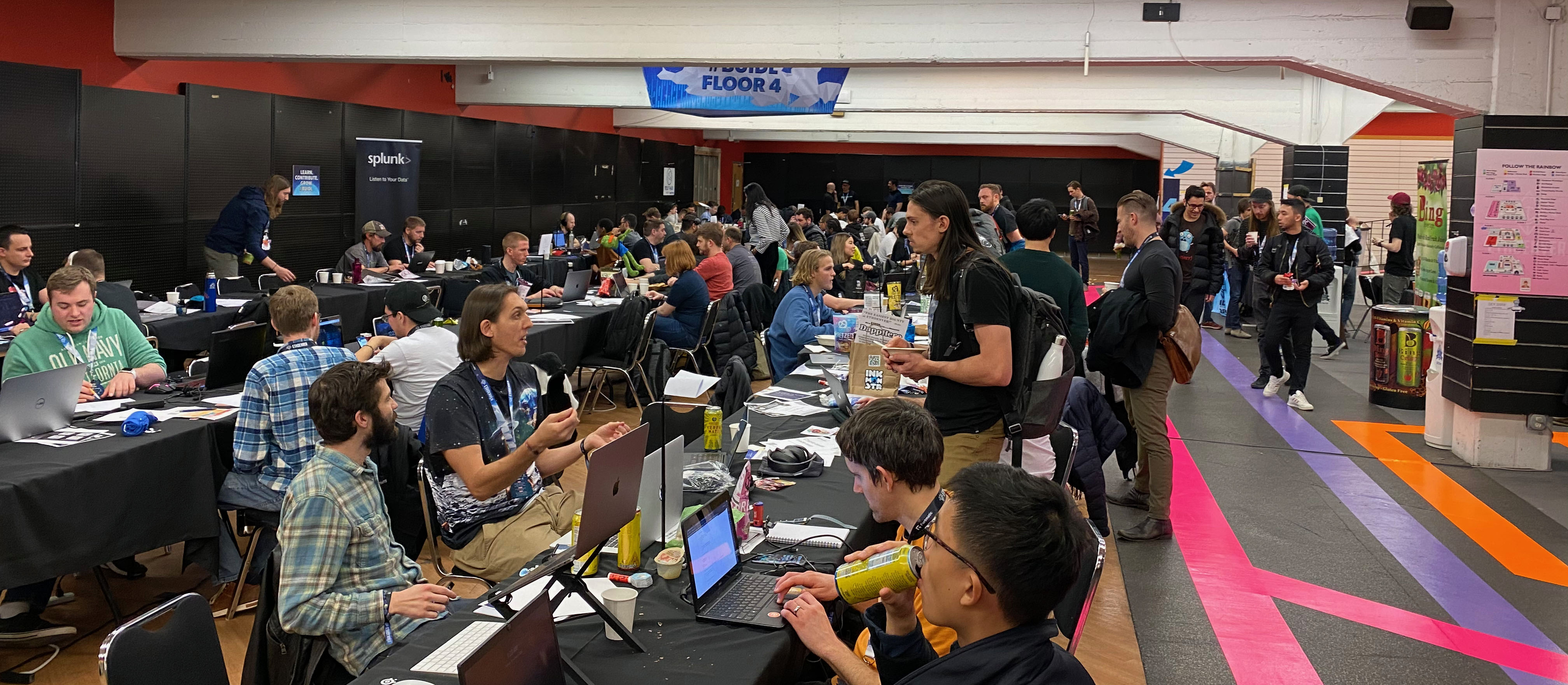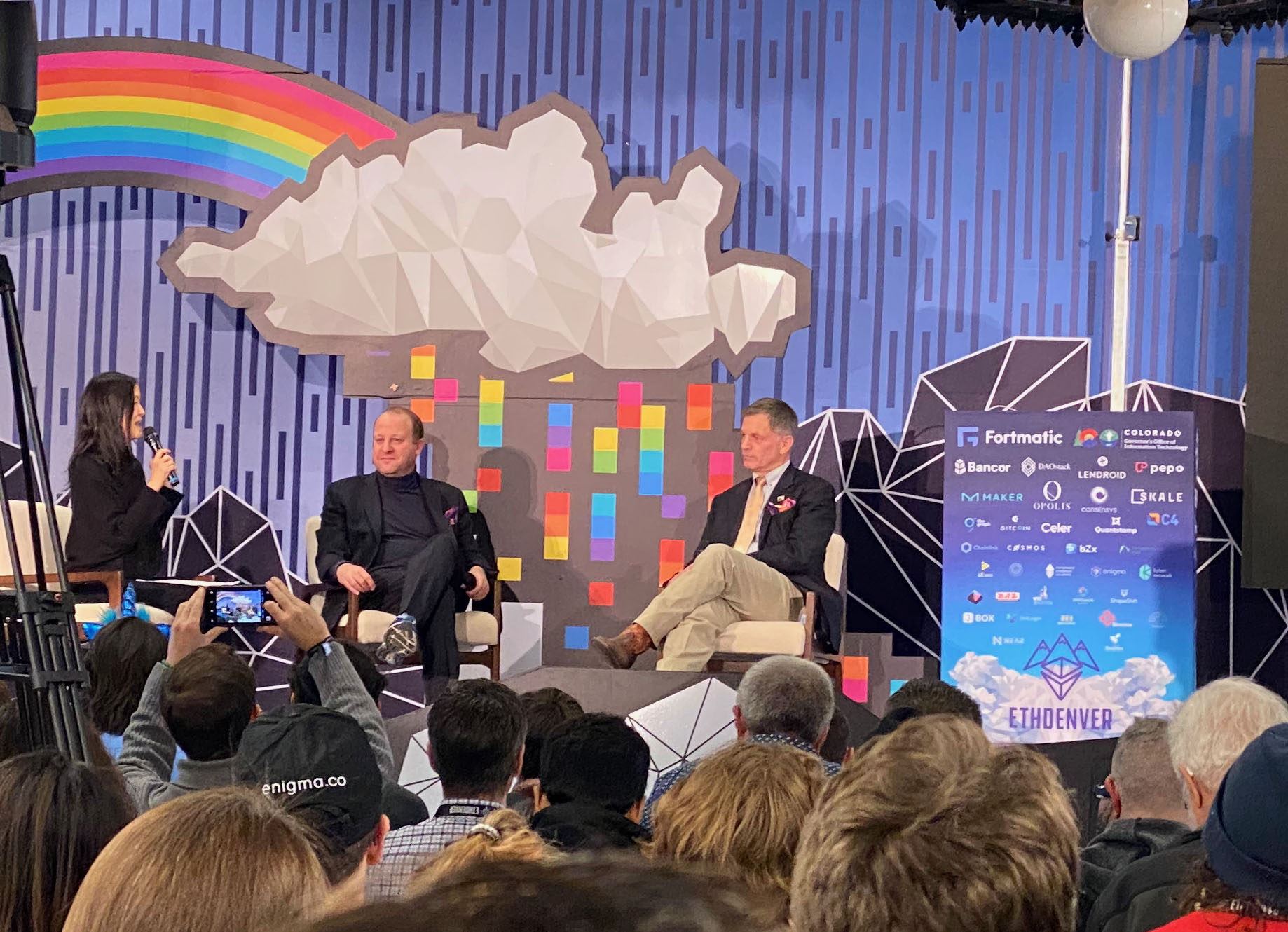February 17, 2020

ETHDenver: A Glimpse into the Future
I signed up for ETHDenver 2020 hoping to learn more about cryptocurrency. What I came away with was questions about the viability of, well, everything. Yes, the blockchain promises to revolutionize our world, but it’s more than that. The thing that stood out after a weekend at ETHDenver wasn’t the tech, it was the people and the process. Let me try to explain what I saw and why it is important.
ETHDenver takes place at the Sports Castle, an old warehouse building that has nothing at all to do with sports or castles. With chipped paint, brick walls, exposed wires, and boarded up windows, the Sports Castle comes equipped with all the pleasantries of a hacker dystopia. The film crew for Mr. Robot could show up and begin filming without modification, and no, the homeless tents in the streets aren’t props.
For someone used to traditional hotel-style venues, the warehouse vibe was disorienting at first. I have been primed to expect dry danishes and empty conference rooms connected by long carpeted hallways where attendants avoid eye contact as they shuffle between PowerPoint presentations. ETHDenver isn’t your typical venue.
Once you get your bearings, the magic of the Sports Castle’s unique architecture becomes apparent. Despite it being a six story building, there isn’t an elevator. There are no doors, dividing walls, or separate rooms. Everything is open, connected, and accessible. Each floor is linked by a ramp that ascends to the next floor, corkscrewing you up another level. The effect is a seamless flow of people, united, alive, and activated. If the noise and bustle overwhelms you, there is a dark room behind a curtain filled with giant beanbag chairs where the workers are coaxed into a productive trance state by a DJ.
The coffee, energy drinks, fruit, and salty snacks are all free and regularly restocked by a dedicated crew that tries to keep pace with the hackers. If you need a full meal, there are food trucks parked right outside the front entrance. To pay, scan the QR code with a burner wallet, a compelling demonstration of cryptocurrency in action.

The thing that is harder to describe is the energy of ETHDenver. Teams converge and migrate around the building, switching between intense collaborative conversations and deep coding sessions isolated by noise-cancelling headphones. Once my team had our idea we sketched out some loose wireframes, each of us claimed chunks of work that aligned with our skills, and we dug into the project. There was no project management software, no job titles, no story points, no egos - only builders finding thrill in contributing, learning, and solving problems.
The sense of mission was palpable. Combine the excitement of a hackathon with the unstoppable idealism of the blockchain community and you can’t help but conclude that anything is possible. Ideas become code and the world changes.
You can’t help but ask an uncomfortable question. Why is it happening here? Why not in business settings? Why not in churches? Why not in schools? Why not in government? Why is it that our biggest institutions feel lifeless and empty while a band of developer strangers can assemble for a weekend and all of a sudden the future seems hackable?

Even government felt bendable in the face of ETHDenver. On Friday evening the governor of Colorado, Jared Polis (democrat) and the governor of Wyoming, Mark Gordon (republican) shared the stage answering questions from podcaster Laura Shin. Despite their political differences, they seemed to agree that the future of crypto is bright and they aren’t waiting for federal green lights before they take advantage of blockchain technology.
Now granted, cryptocurrency is big business and the smell of money hung over the sponsorship booths as companies begged the developers to use their tools and tried to lure the talent toward their job postings. ETHDenver is a competition after all, with big prizes up for grabs to whoever wins the awards, so I won’t fool myself into thinking that altruism is the only thing driving these developers. But it is hard not to believe in these hackers, to get swept up in a current that seems to point to a better future.
After a weekend of euphoria, in the hours before returning to the weekly routine, it is impossible to avoid contrasting the atmosphere of ETHDenver and modern, corporate workspaces. Open offices theoretically strive for the Sports Castle atmosphere but fail miserably. Open office spaces end up being more about accountability than collaboration. It is easier to create an illusion of efficiency when the room is full of clicking keyboards. Leaders cling to traditional offices on the edge of the open area, watching the workers from behind glass.
The other comparison that I can’t shake is school, where classroom layouts mimic the corporate structure where the students will find themselves after graduation. A teacher, the boss, stands at the front of the room. In front of him are hierarchal rows of workers sorted in descending order of their productivity. The kids in front will advance to careers in the business world while the slackers in the back drop off the corporate bus. If I had to guess, I would say the attendees of ETHDenver can relate more to the kids in the back than the teacher-pleasers up front. But rather than fall off the bus they somehow seem to be driving us into the future.
I believe there is a lesson hiding within the contagious energy of ETHDenver. Perhaps more states will follow the crypto-friendly path being forged by Colorado and Wyoming. Perhaps the next trends in office design will emerge from makeshift hackathon working spaces. Perhaps there is a version of our education system on the horizon that primes kids for more than middle management, instilling a hacker ethos in the children who will lead us into the golden age. It might be closer than we think.
Thanks for reading. If you enjoy my writing, I am giving away Art of the Living Dead to everyone who joins my personal email list, Letter Zero. That’s also the best way to stay up to date with news about my next book, User Zero.
Stay creative.
Previous: My 2019 Year in Review
Next: The Invisible Golden Age